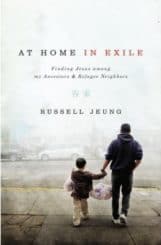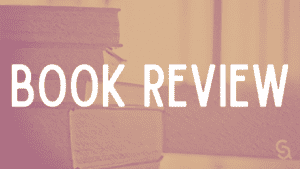
If you want to read a book that will make you want to move into an under-resourced urban community to change the lives of said community’s residents and feel like a hero, find another book.
This book is one that will make you laugh, wonder about the sanity of the author, question whether or not we Christians understand the Gospel well enough to live it and live into it, and make you think twice before you decide you know enough about what justice looks like in urban communities and set off to save the city.
At Home in Exile is a book that won’t let go of your conscience.
Russell Jeung isn’t sentimental about what he gave up to live among refugees. He writes unabashedly about the challenges, disappointments, and hard-earned lessons of becoming part of an underserved community, and his honesty rattled me as I sat in my comfortable suburban home. Jeung doesn’t guilt you into caring. He invites you to see what you are missing.
Jeung invites readers into his life experiences and expectations, including the hope that life would turn out to be like a Disney movie where social misfits experience loss and then go on to become their true, perfect-pitch selves. If you’ve met Jeung, it’s rather amusing to find out that his is how he envisioned not only life but specifically his life.
Jeung is, no offense intended, an unassuming man. He does not carry himself as many experts often do—entering a room and taking up both physical and psychological space. Many people who are “known” in Christian justice circles may never have heard of Jeung.
Readers learn it is because Jeung, and then in time his wife and family, aren’t always in the faithy social justice conference circles because he has been busy living in and becoming part of the community, learning about his neighbors, himself, Jesus, and the intersections.
Jeung avoids creating caricatures or a sugar-coated picture of what it looks like to live as a guest, as a Hakka—a distinct linguistic group in China that moved so frequently that the term “Hakka” means ‘guest families’—in exile amongst people who also have been displaced. He also expands the narrative because his neighbors are black and brown, African American, Latino and Southeast Asian. He reminds readers that urban justice includes refugees.He walks us through real lives, real neighbors, and real mistakes with the kind of dignity and respect people of color long for as our own stories are often used by those who are in the center of the stories. Jeung masterfully avoids centering his own story as a voyeur, watching and drawing his own conclusions about what it means to live in the margins. Instead, he invites readers into his own learning and awakening of why he has longed for a Disney princess life and how the faithfulness of people so outside of our American Dream embody the hope we say we have in Jesus.
He reminds readers that urban justice includes refugees.He walks us through real lives, real neighbors, and real mistakes with the kind of dignity and respect people of color long for as our own stories are often used by those who are in the center of the stories.
His book is as much about justice as it is about how ethnic identity is another space of intersection in our faith, and how both inform the other as to our understanding and application of the Gospel.
Jeung does not glamorize his life and the life of his refugee neighbors. He does not write with a hidden agenda to create false guilt. He writes in unassuming, humble, unflinchingly honest words about what living in to Jesus’s invitation to be his hands and feet can look like.
And that is the invitation that gnaws at my conscience.
Kathy Khang is a writer, speaker, and coffee drinker based in the north suburbs of Chicago. You can connect with Kathy at her blog, on Facebook, or on Twitter and Instagram @mskathykhang.


